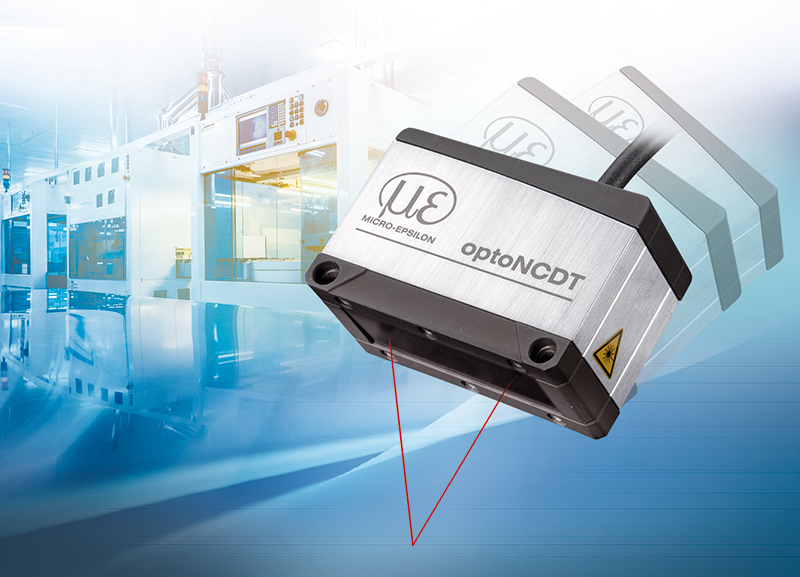Precision sensor manufacturer Micro-Epsilon continues the development of its comprehensive laser triangulation sensor range with the addition of the optoNCDT 1900. Ideally suited for both dynamic and high resolution measurement tasks, it features a completely new compact sensor housing with innovative mounting sleeves that ensures a repeatable sensor position and alignment to the target.
 The new optoNCDT 1900 laser triangulation sensors from Micro-Epsilon offer even higher performance and are more compact, making them ideal for automation tasks.
The new optoNCDT 1900 laser triangulation sensors from Micro-Epsilon offer even higher performance and are more compact, making them ideal for automation tasks.
This new performance class of laser sensor is perfect for high speed distance, displacement and position measurements in a wide range of automation tasks, including machine building, robotics, automotive production, 3D printing and coordinate measuring machines.
The new optoNCDT 1900 laser triangulation sensor offers a unique combination of speed, size and performance. The sensor itself has dimensions of 70 x 31 x 45 mm and weighs just 185 g. The measuring rate is continuously adjustable up to 10 kHz and can be individually adapted to suit each measurement task. Newly developed, high performance optics create a small spot size onto the target, which enables tiny objects and surface details to be measured. A new larger aperture for the receiver ensures greater accuracy and repeatability when compared to other sensors of similar measurement range. The sensor itself is also extremely robust with the ability to withstand high shock and vibrations, like those seen in vehicle testing, as standard.
Two-stage averaging
For the first time, a two-stage measurement average is available for signal optimisation. This enables the sensor to provide a clean signal output at edges and steps. The high performance averaging ensures a stable, precise signal output and is particularly suitable for high speed measurements of fast moving parts.
The sensor uses the newly developed Advanced Surface Compensation (ASC) algorithm that allows it to operate almost regardless of the target material and colour. The exposure time or amount of light produced by the laser sensor is optimally matched to the reflection characteristics of the target surface, which enables reliable measurements even of difficult, changing surfaces. The sensor is extremely resistant to ambient light interference and so can be used in high illumination environments including those situations where lasers are combined with Vision Systems and their associated LED lighting. The new software algorithms compensate for ambient light up to 50,000 lux, which means operation in direct sunlight is also improved.
Mounting sleeves and highly flexible cables
Mounting the sensor is also fast and easy, with new fitting sleeves provided that automatically align the sensor in the correct position. This enables both easy sensor replacement and ensures continued high precision measurements to be taken with confidence that the new sensor is looking at the same point on the target. Highly flexible cables and a robust IP67 protected aluminium die cast housing make the sensor ideal for industrial use.
Using the now familiar Micro-Epsilon web interface, the optoNCDT 1900 is incredibly easy to set up and use without requiring any installed operating software. The settings for the measurement task can be quickly selected using application-specific, predefined presets. These are available to suit a wide variety of materials and surface types, including metals, plastics and organics. These presets enable rapid, straightforward set up and help to optimise the sensor for specific tasks.
New advanced features for peak separation and peak width determination enable reliable measurements on coated materials, measurement objects located behind glass and on film-sealed components. Data output is via analogue or digital RS422 interface. By using the Micro-Epsilon IF2030 interface module, EtherNet/IP and PROFINET are also available.
Glenn Wedgbrow, Business Development Manager at Micro-Epsilon UK comments: “The combination of enhanced performance, compactness and wide range of new features result in a laser sensor that sets new benchmarks for advanced automation tasks. Due to its compact design, integral controller, flexible mounting options and advanced surface compensation features, the optoNCDT 1900 is extremely versatile and will solve a wide variety of applications on industrial plant, machines, automated production lines and robots.”
The optoNCDT 1900 series is available in measuring ranges from 10 mm up to 50 mm (with higher ranges from 100 mm up to 500 mm planned for launch in 2021). Linearity is from <± 2.0 microns.